- Home
- Steven Ehrman
The Eccentric Painter (A Sherlock Holmes Uncovered Tale) Page 3
The Eccentric Painter (A Sherlock Holmes Uncovered Tale) Read online
Page 3
“It is sometimes best, Watson, to arrive when one is not expected. In any case, my investigations here in London are complete.”
“Indeed?”
“Indeed, Watson. You will perceive that I have already received several telegrams in answer to my inquiries of last night,” said he, as he pointed towards his desk.
“You have received answers already?” I asked.
“That I have, Watson. Our English post lets no grass grow beneath its feet, and all my inquiries were here in London, so there was no delay.”
“Were the answers helpful, Holmes?”
“Say rather instructive, Watson. There is a possible avenue towards a solution, but I will need to inspect the scene of the crime in order to arrive at a solution.”
“But surely you have a theory, Holmes,” said I.
“I do indeed, doctor, but it is dangerous to set one’s ideas in stone before viewing all the facts.”
“I take it you will keep your own consul as usual, Holmes. Can you not give me some idea of your thinking?”
“Indeed I can, doctor. I think we should eat while our breakfast is still hot. Shall we?”
Chapter Six
Within an hour, we were in a carriage to Livingstone Manor. I had suggested that we take the train, but Holmes said that he needed the time to arrange the facts in his mind, so we had engaged a carriage. The trip to West Kent was only some fifteen miles, so I had readily agreed. There is perhaps no scenery more beautiful than the English countryside in the spring. The miles passed pleasantly enough, although Holmes could not be drawn into conversation. He only became animated as we approached the manor house in the early afternoon.
As we turned down the long drive, Livingstone Manor came into view. It was a large castle-like structure of some three stories, built in the gothic style, with stone balustrades along the roof. It was an imposing building, and I began to see why David Livingstone had chosen the roof of the manor to serve as his outdoor studio. The view from the roof commanded half of the valley. There was more than enough inspiration in that view to satisfy a dozen painters for a lifetime. Holmes seemed transfixed by some part of the architecture of the house, but would not be drawn out when I asked him what he was so fascinated by.
We had barely alighted from the carriage when the figure of Miss Livingstone burst through the front door to meet us.
“Oh, Mr. Holmes, and doctor, I am so glad you are here,” cried she. “Things have worsened since my visit to London.”
“Collect yourself, my dear, and tell us what has happened,” said Holmes.
“Of course, Mr. Holmes. Won’t you please come in, and we can discuss the matter.”
We soon found ourselves in the library of the manor house. Miss Livingstone had rung for tea and she was seated in an armchair by the window facing the road. I had taken a seat on a sofa, and Holmes was pacing back and forth across the room peering out of the windows as he did.
“Now, Miss Livingstone, pray enlighten me to the new facts,” said Holmes.
“My poor cousin has worried himself into a sick bed, Mr. Holmes,” she fairly sobbed. “I am worried for his health should this cloud linger for much longer.”
“Which cousin?” asked Holmes.
“Why, Harold.”
“Not Nigel? He is your cousin as well, is he not?”
“Certainly; it is just that I do not think of Nigel as a cousin first, as I do with Harold. Also, Mr. Holmes, no one could imagine Nigel collapsing as poor Harold has. Harold has always been delicate since his youth, and remains a very delicate young man.”
“Are there no other differences, Miss Livingstone?” asked Holmes.
Before she could answer a male voice intervened.
“Of course there are, sir,” said the man standing in the doorway.
He continued into the room and took a post next to Miss Livingstone. He was a trim resolute-looking fellow with a ruddy complexion and a stern, yet honest countenance.
“The main difference is that I have worked my entire life, while my Cousin Harold is as delicate as the hothouse flowers he tends,” said he. “Also, I would never leave my Cousin Jane to deal with this terrible tragedy on her own. Allow me to introduce myself. I am Nigel Livingstone, the late Mr. Livingstone’s secretary, and Jane’s fiancé.”
Miss Livingstone’s face reddened visibly as Nigel Livingstone made his statement.
“Nigel,” she protested. “You have no right to make such an announcement.”
“I have every right,” said he calmly.
“But with Uncle David’s death-”
“All the more reason to,” said Nigel. “You need someone looking out for your interests. As your future husband, that is my responsibility.”
“That would seem to be a lucrative responsibility, Mr. Livingstone,” observed Holmes.
“When I first proposed marriage to Miss Livingstone, she had no prospects, Mr. Holmes,” said he blandly.
“But did that change?” asked Holmes mildly.
“Well…as a matter of fact…the late Mr. Livingstone did mention something about making a bequest, were we to carry on his line. You see, Mr. Holmes, Mr. Livingstone had a mania concerning continuing the family name, as he had no offspring; and even though I am a distant relative, if Jane and I were to marry, it would continue the line, as it were.”
“Miss Livingstone mentioned this obsession in our initial meeting. So Mr. Livingstone approved you as a suitor. What of his ward, Mr. Harold Livingstone? Surely, as his nephew, Harold was the more appropriate choice as carrier of the line. Did your uncle have no preference, Miss Livingstone?”
“When I first came to live with my uncle, he indeed did suggest Harold as a possible husband,” said she.
“But you objected,” observed Holmes.
“Not exactly, Mr. Holmes,” said she. “I adore Harold, but I did not feel a marriage with him was desirable for reasons of my own.”
“And you will not share those reasons?” asked Holmes.
“I will not,” responded Jane primly.
“Was it perhaps information you received from someone in the household that made marriage to Harold Livingstone undesirable?”
Holmes shot a glance at Nigel as he said this.
“Really, Mr. Holmes,” began Nigel.
Jane raised her hand to stop him.
“My reasons are my own, Mr. Holmes, and that quite closes the matter,” she said firmly.
Holmes seemed on the verge of saying something when we were interrupted by new visitors. Three men entered the library. Two were burly, uniformed police sergeants, whilst the third was a small terrier-like man with an eager inquisitive face and a bristling mustache. He strode quickly up to Holmes with his hand extended.
“You would be Mr. Holmes, I am sure,” said he.
“And you are the Inspector Savage that Jones told us of,” said Holmes.
“I am glad to have you here, Mr. Holmes. I don’t mind saying that we are at a loss in this case. I am familiar with your reputation and methods. Consider myself at your disposal,” said Savage.
Holmes would deny it, but the naked flattery and admiration of Savage made an impression upon him, as flattery does for most of us, and he clapped Savage upon the shoulder.
“I should think that we can perhaps make some progress in this case,” said Holmes.
“You give me new hope,” said Savage beaming. “What can I do to help you towards a solution to this foul mystery?”
“I would very much like a look at the grounds of the manor and the roof where Mr. Livingstone was murdered.”
“Of course, Mr. Holmes,” cried the Inspector.
“If you would please leave these two gentlemen here,” he gestured towards the police sergeants. “You and I can observe the grounds together. I would like to go over a few small matters with you.”
“Holmes, would you like me to accompany you? I would be anxious to see the site of the murder,” said I.
“I wouldn’t drea
m of pulling you away from the charming Miss Livingstone, Watson. This will not take too long,” said he airily.
With that Holmes, and the Inspector exited the library. Conversation between myself, Miss Livingstone, and Nigel continued, but it was subdued. Miss Livingstone seemed terribly upset by something, and Nigel was peering out the windows, attempting to see what Holmes and the Inspector were doing. For myself, I felt badly used by Holmes. It was typical of him to guard his thoughts, but excluding me from the crime scene was uncalled for, in my opinion. After several desultory attempts to steer the conversation into areas that were not concerned with the murder I gave up, and the room sank into an uneasy silence. The two sergeants were statues and remained by the door as if guarding against our leaving or anyone coming in. After an absence of some 45 minutes, Holmes and the Inspector returned.
“Learned anything of interest without me, Holmes?” I asked, in a somewhat hostile manner.
“Perhaps, doctor. Thank you for your interest,” said he. Holmes could be absolutely immune to sarcasm, to my annoyance.
“I have a proposal,” said Holmes. “The Inspector has agreed to it, and I hope the rest of you will also.”
“What is it, Mr. Holmes?” asked Jane.
“We shall do a reenactment of the crime. Miss Livingstone, I wish you to sit just as you are, and read as you were doing the day of the tragedy. Mr. Livingstone, I believe you were working on correspondence for the deceased at the time on the second floor in the other wing.”
“That is true, sir,” said Nigel.
“Now, three members of our cast are unavailable. Mr. Harold Livingstone is indisposed, and I will take his part. The postman could be brought over, but the good Inspector has consented to play his role. As for the deceased, his role will remain open. As it is nearing three o’clock, the scene is as close to the original as possible. Now, Mr. Livingstone, if you will ascend to the office, and, Inspector, if you will assume your post, we can begin. I will take the absent Mr. Livingstone’s place in the garden outside the window.”
“And what is my role, Holmes?” asked I.
“I wish you to remain here, Watson. This reenactment may be difficult for the young lady, and I wish you to stay with her in this hour of need.”
“But surely the sergeants can-”
“Watson, I am entrusting you with this assignment,” said Holmes. “The sergeants will accompany the Inspector to his post on the road. Now if we will all take our places, we can begin.”
Chapter Seven
Everyone left the room, per the instruction of Holmes, and I was left alone with Miss Livingstone. She was putting on a brave face and began reading a book. Evidently she was going to follow Holmes’s instructions to the letter. I sat in silence and looked at the clock. It was ten minutes short of three. I saw the shadow of Holmes as he passed the window on the garden side of the room. The wait seemed interminable as the minutes passed. As it neared three o’clock I felt a thrill run through my body in anticipation of I knew not what. Just before the clock struck the hour, I heard the voice of Holmes outside the window.
“Hallo! What is wrong with the Inspector?”
I leapt to my feet and crossed the room to the window. The Inspector was gesturing towards the roof and was in full flight down the drive leaving the two bulkier sergeants in his wake. He was soon at the front door, and began pounding on it. Miss Livingstone and I quickly ran out of the library and let him in. Holmes and Nigel joined us at almost the same time.
“Who locked this door?” asked Savage, as he burst in breathing heavily.
“It was I, Inspector,” said Holmes. “If everyone will come back into the library I believe we can explain everything.”
“But, Mr. Holmes, someone was on the roof. I saw him.”
“I know, Inspector. It will all be clear soon.”
“Well, I should hope so, sir,” grumbled the Inspector. Despite his admiration for Holmes, he was unprepared for the high-handed manner Holmes could assume when he had a solution in hand. I could see by the fire in Holmes’s eyes he had solved the case, but how he had done it was a mystery to me still.
We were all soon seated in the library and Holmes stood before us.
“Last evening, when Miss Livingstone came to London to seek my consul, she laid a difficult case in front of me. Either her beloved uncle had been murdered by a person outside the household, in which case every passing day lengthened the odds of his capture, or the crime had been committed by an intimate of the household.
“There were two items in her narrative that struck me immediately. The first was the timing of the murder, and the second was her uncle’s mania that the family line be extended, and extended through a male Livingstone so as to carry on the family name. There were other instructive parts of her tale that I soon found corroborated my initial theory. With that theory in mind, my dear friend Watson and I came here today to conduct a test. This test we have just completed and it confirms the identity of the murderer.”
All those in the room were holding their breath. Holmes looked at each of us, and, I thought, most intently at Nigel Livingstone.
“Tell us, Mr. Holmes,” pled Jane Livingstone. “Nothing could be worse than not knowing.”
“I sincerely hope you find that to be true, my dear,” said Holmes. “For the killer is your cousin, Mr. Harold Livingstone.”
“What?” exploded Inspector Savage. “Mr. Holmes, I have given you a free hand, but this seems ridiculous. Did we not just prove that Harold was in the garden by the library window?”
“In point of fact, Inspector, I have proven the contrary. Miss Livingstone, cast your mind back to that day and recall your cousin’s voice. Did my voice sound similar?”
“Why…yes, yes it did, Mr. Holmes,” she said, closing her eyes to concentrate. “They both had a odd quality, but the wind was blowing heavily both days, as it generally does in the spring.”
“Miss Livingstone, do you recall my asking you if your late uncle had modernized the manor?”
“Yes, Mr. Holmes. I told you he had put in gas, plumbing, and drainage pipes.”
“Precisely, my dear, and that is how your cousin decided to murder his uncle with a perfect alibi for himself. He pretended to go into the garden, and indeed likely did for a time, and then he waited until three o’clock. Knowing the postman would set the time of the attack; he crept in the rear entrance and up the stairs to the roof. Making certain the postman saw him; he quickly strangled his uncle and then threw himself to the roof and yelled into the drainpipe, which comes out right next to the library. I noticed this at once as I came down the drive today. Once this was done, he quickly ran back down the stairs, and pretended to have just entered the house. The postman would swear the murder occurred precisely at three, and you would swear your Cousin Harold was on the lawn at that moment. Because no one suspected him, no one wondered why he came in the rear entrance, when logically he should have come around front to question the postman. I am afraid you quite missed that, Savage.”
Inspector Savage seemed crestfallen and was about to speak when a figure lurched into the library. It was a thin, almost emaciated young man dressed in a nightshirt, and in his stocking feet. The effect was almost comical, except for the naked hatred in his eyes.
“So you think you figured it out, Mr. Holmes?” said the young man.
“Harold, why would you do such a thing to poor Uncle David,” wept Miss Livingstone.
“As if you have to ask, you simpering shrew!” he nearly shouted at her. “Everything would have been fine if you had never come here putting ideas into his head. You made him think he could be a patriarch. You tried to steal my fortune! It would have been mine! I had to do it!”
With that statement he fainted and would have crumpled to the ground had he not been caught by one of the police sergeants.
“Take him back to his room and guard him,” Savage ordered the man. “And, you, go back to the village and telegraph the Yard.”
H
e directed his last comment at the other policeman, who promptly saluted and left the room. Jane Livingstone was weeping on the sofa with Nigel Livingstone’s arm around her for comfort.
“Holmes, you have demonstrated how it was done, but I still do not see what would drive an educated gentleman like Harold Livingstone to kill his benefactor in cold blood,” said I.
“I also would like to know how you spotted him, Mr. Holmes,” said Inspector Savage. He again spoke with adoration towards Holmes.
“It was an elementary observation that there had been two major changes in the household recently. Firstly, Miss Livingstone became a ward of her uncle’s. This was an inconvenience to Harold’s dreams of inheriting his uncle’s estate, but a minor one. He hoped to marry her and make her an ally rather than an enemy, and the lady seemed agreeable at first. However, when Nigel Livingstone came into the picture, she cast him aside for her distant cousin. This created an enormous danger. Harold knew, of course, of his uncle’s mania for a Livingstone heir, and should Jane marry her Cousin Nigel, his uncle would likely split the inheritance between them. I think you will find when Harold talks; he will admit his uncle told him that this was his plan.
“But Harold had other issues. After my interview with Miss Livingstone, I made inquiries into the state of the Livingstone fortune and the character of Mr. Harold Livingstone. As to the former, inquiries at some of the major trading houses revealed huge losses in recent years for David Livingstone. Remember, the gambler streak runs deep in the family. The losses did not mean poverty by any stretch, to the estate, but it was a major loss all the same, and if David Livingstone continued to plunge in the market, he might very well have lost it all. As to the latter point, in the guise of a common lounger, I made inquiries in dozens of taverns in London near his club and discovered that Harold Livingstone was a known denizen of many of them. Once again, the dissolution and the tendency towards drink runs strong in his blood. Both his father and grandfather were notorious drinkers. I believe that Miss Livingstone suspected this, and that is what drove her to break any understanding towards a betrothal between the two. Is that not correct, Miss Livingstone?”

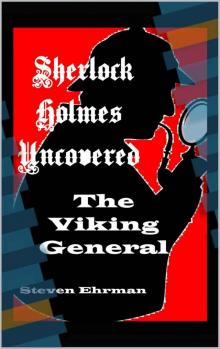 The Viking General (A Sherlock Holmes Uncovered Tale Book 9)
The Viking General (A Sherlock Holmes Uncovered Tale Book 9)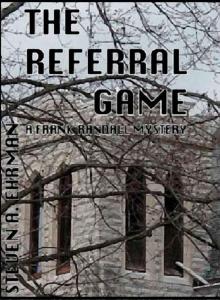 The Referral Game (A Frank Randall Mystery)
The Referral Game (A Frank Randall Mystery) Collection of Four Short Stories
Collection of Four Short Stories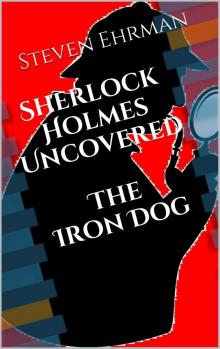 The Iron Dog (A Sherlock Holmes Uncovered Tale)
The Iron Dog (A Sherlock Holmes Uncovered Tale) The Eccentric Painter (A Sherlock Holmes Uncovered Tale)
The Eccentric Painter (A Sherlock Holmes Uncovered Tale)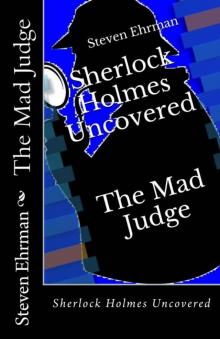 The Mad Judge (A Sherlock Holmes Uncovered Tale Book 3)
The Mad Judge (A Sherlock Holmes Uncovered Tale Book 3)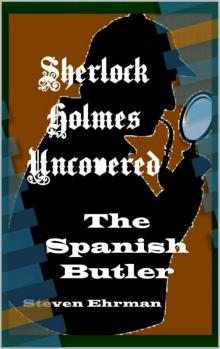 The Spanish Butler (A Sherlock Holmes Uncovered Tale Book 8)
The Spanish Butler (A Sherlock Holmes Uncovered Tale Book 8)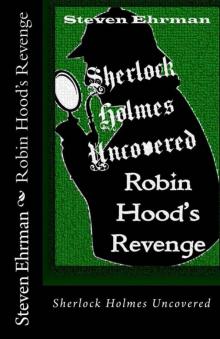 Robin Hood's Revenge (A Sherlock Holmes Uncovered Tale Book 7)
Robin Hood's Revenge (A Sherlock Holmes Uncovered Tale Book 7)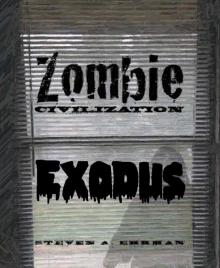 Zombie Civilization: Exodus (Zombie Civilization Saga Book 2)
Zombie Civilization: Exodus (Zombie Civilization Saga Book 2)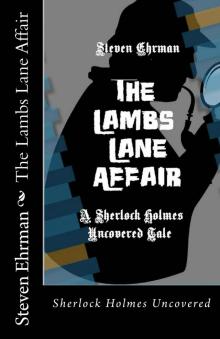 The Lambs Lane Affair (A Sherlock Holmes Uncovered Tale Book 5)
The Lambs Lane Affair (A Sherlock Holmes Uncovered Tale Book 5)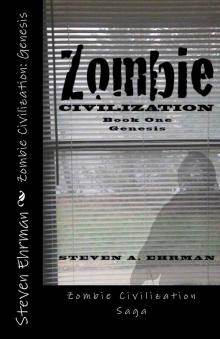 Zombie Civilization: Genesis (Zombie Civilization Saga)
Zombie Civilization: Genesis (Zombie Civilization Saga)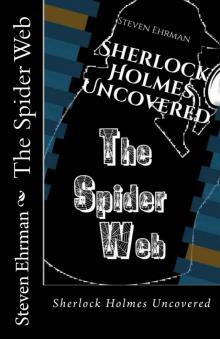 The Spider Web (A Sherlock Holmes Uncovered Tale Book 4)
The Spider Web (A Sherlock Holmes Uncovered Tale Book 4)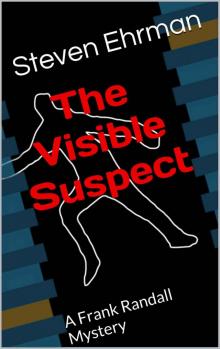 The Visible Suspect (A Frank Randall Mystery)
The Visible Suspect (A Frank Randall Mystery)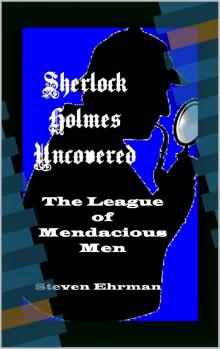 The League of Mendacious Men (A Sherlock Holmes Uncovered Tale Book 10)
The League of Mendacious Men (A Sherlock Holmes Uncovered Tale Book 10)